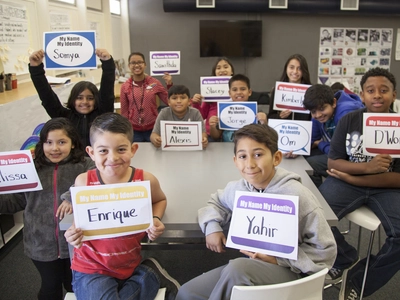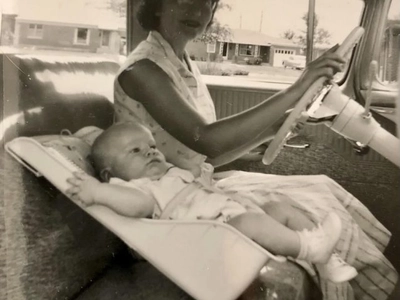Why Your Child Might Use a Different Name at School: The Quiet Transformation of Identity
Your child comes home from school, and something feels... different. Maybe it's the way they carry themselves, or a new phrase they keep using, or how they suddenly refuse to answer to the nickname you've called them for years. You brush it off as a phase, but what if I told you that these seemingly small changes are actually profound signals of one of the most important processes happening in your child's life?
The Secret Life Your Child Lives at School
While you're at work thinking about grocery lists and mortgage payments, your child is conducting one of the most sophisticated psychological experiments known to humanity: figuring out who they are. And here's what might shock you – they're doing it by trying on different versions of themselves like clothes in a dressing room.
That quiet kid who barely speaks at home? They might be the class clown at school. Your chatty, confident daughter might introduce herself with a completely different name to new classmates. Your son might tell his teacher he prefers a shortened version of his name that you've never heard him use.
And the most unsettling part? They act like it's completely normal.
Why Your Child's Name Experiment Isn't Just a Phase
When children start experimenting with their names or identities at school, parents often panic. "Where did I go wrong?" "Why doesn't my child like the name we carefully chose?" "Are they rejecting us?"
But child psychologists have discovered something fascinating: identity experimentation is not rebellion – it's development.
Dr. Erik Erikson's groundbreaking research shows that around ages 8-9, children begin what he calls "industry vs. inferiority" – essentially, they start figuring out what they're good at and where they fit in the social world. This is when the quiet transformations begin.
Your child isn't rejecting you when they ask to be called "Alex" instead of "Alexander" at school. They're testing: Does this version of me feel more authentic? Do I like how people respond to this name? Does this identity match who I think I am inside?
The Invisible Metamorphosis Happening Right Now
Here's what's really happening in your child's mind during these "quiet transformations":
They're conducting market research on themselves. Every interaction at school becomes data: Which version of me gets positive responses? Which identity feels most comfortable? Which name makes me feel most like... me?
They're building their social identity separate from their family identity. For the first time, they're discovering that they can be different people in different contexts. The child who is "responsible big sister" at home might want to be "funny Emma" at school.
They're preparing for adolescence. These early experiments with identity are practice runs for the more intense identity formation that happens in teenage years.
The Warning Signs vs. The Normal Signs
As a parent, how do you know when these transformations are healthy development versus something to worry about?
Normal identity experimentation looks like:
- Trying different versions of their name
- Experimenting with new interests or hobbies
- Acting differently with friends than with family
- Testing new personality traits
- Showing increased independence
Red flags that need attention:
- Sudden dramatic personality changes overnight
- Secretive behavior about school or friends
- Regression in previously mastered skills
- Signs of distress or anxiety about identity issues
- Complete rejection of family values or traditions
What This Means for Your Parenting
The hardest part about these quiet transformations is that they often happen without your input or permission. Your child walks out the door as "Matthew" and somehow becomes "Matt" by third period, and you're the last to know.
But here's what you need to understand: This isn't about you failing as a parent. This is about your child succeeding as a developing human being.
Your role isn't to stop these experiments – it's to create a safe home base where your child can process them. When they come home after a day of being someone slightly different, they need to know that your love is constant, even if their identity is fluid.
The Conversation You Should Have Tonight
Instead of interrogating your child about why they want to be called something different, or why they're acting strange, try this approach:
"I've noticed you seem to be figuring some things out about yourself lately. That's really normal and healthy. I want you to know that I love you no matter what you discover about who you are, and you can always talk to me about anything you're thinking or feeling."
Then – and this is crucial – wait. Don't push for immediate revelations. Just let them know the door is open.
The Beautiful Truth About Growing Up
Here's what I wish every parent understood about these quiet transformations: Your child isn't moving away from you – they're growing into themselves. Those small experiments with names, personalities, and identities aren't rejections of what you've given them – they're explorations of what they might become.
The child who tries on different names at school isn't confused about their identity – they're actively constructing it. They're taking the foundation you've built and starting to add their own rooms, their own decorations, their own style.
And one day, when they've finished experimenting and exploring, they'll come back to you with a clearer sense of who they are. Sometimes they'll keep the name you gave them. Sometimes they won't. But they'll always carry the love, values, and security you provided while they figured it all out.
The question isn't whether your child will change – they will. The question is whether you'll trust the process and love them through it.
So the next time you notice one of these quiet transformations, instead of panicking, maybe try feeling proud. Your child feels safe enough to explore, confident enough to experiment, and secure enough in your love to take risks with their identity.
That's not a sign of problems – that's a sign of successful parenting.









